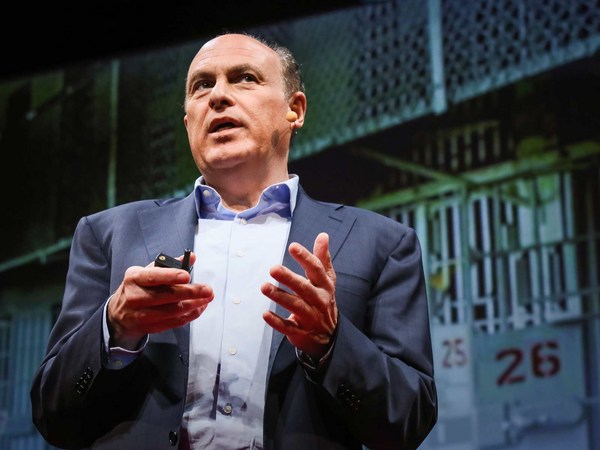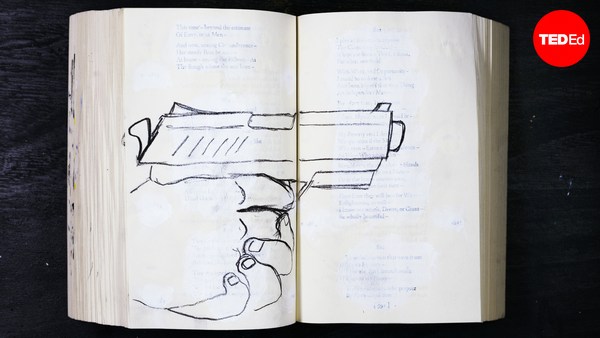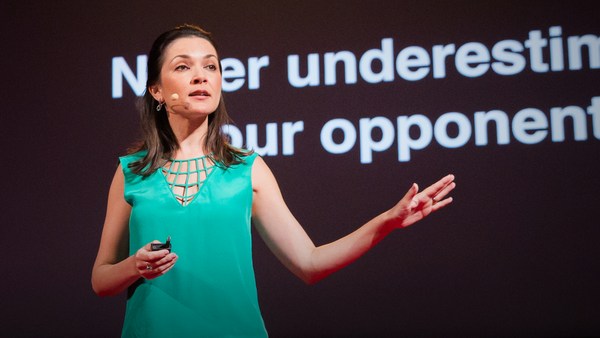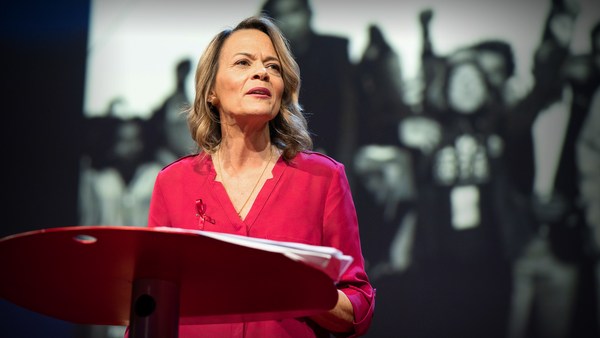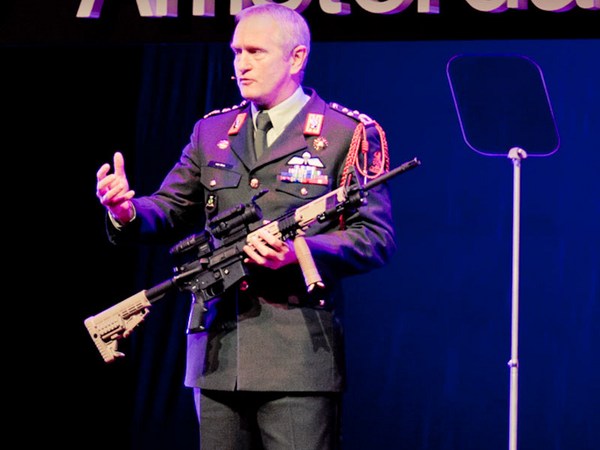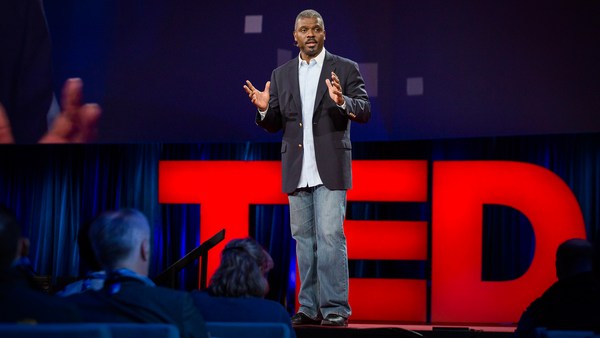OK, so, confession: I've always been weirdly obsessed with advertising. I remember watching Saturday morning cartoons, paying more attention to the commercials than to the shows, trying to figure out how they were trying to get inside my head. Ultimately, that led me to my dream job. I became a partner at a big New York ad agency.
But then, all of that suddenly changed on February 23, 1997, when my little brother Matt was shot in the head in a shooting that happened on the observation deck of the Empire State Building. Suddenly, my family was thrown into the middle of a nightmare, being told that my brother was going to die, actually being given the opportunity to say goodbye to him, then several emergency brain surgeries and now what's amounted, for Matt, to a lifetime spent courageously recovering from a traumatic brain injury. He is definitely my hero.
But as much as (Applause) -- yeah, deserves it --
(Applause)
But as much as this tragedy was a nightmare for my family, I often think about how much worse it could have been; in fact, how much worse it is for the 90 families every day who aren't as fortunate, who lose loved ones -- brothers, sisters, sons, daughters, parents. They don't all make national headlines. In fact, most of them don't. They go largely unnoticed, in a nation that's kind of come to accept a disgraceful national epidemic as some kind of new normal.
So I quit my job in advertising to try and do something about this disgraceful national epidemic, because I came to realize that the challenges to preventing gun violence are actually the same ones that made me love advertising, which is to try to figure out how to engage people. Only instead of doing it to sell products, doing it to save lives. And that comes down to finding common ground, where what I want overlaps with what you want. And you might be surprised to learn, when it comes to gun violence, just how much common ground there is.
Let's look, for example, at people who love to hunt, a sport enjoyed by millions across the US. It's a proud tradition. Families. In some places, the first day of hunting season is actually a school holiday. What do hunters want? Well, they want to hunt. They love their guns. They believe deeply in the Second Amendment right to own those guns. But that doesn't mean there isn't common ground.
In fact, there's a lot of it, starting with the basic idea of keeping guns out of dangerous hands. This isn't about taking certain guns away from all people. It's about keeping all guns away from certain people, and it's the people that, it turns out, we all agree shouldn't have guns: convicted violent criminals, domestic abusers, the dangerously mentally ill. We can all appreciate how Brady background checks have been incredibly effective in keeping guns out of those dangerous hands. In 20 years, Brady background checks at federally licensed firearm dealers have blocked 2.4 million gun sales to those people that we all agree shouldn't have guns.
(Applause)
And whether you love guns or hate guns, you probably also appreciate that there shouldn't be thousands of gun sales every day at guns shows or online without those Brady background checks, just like there shouldn't be two lines to get on an airplane -- one with security and one with no security. And --
(Applause)
And the numbers show the overwhelming agreement among the American public: 90 percent of Americans support expanding Brady background checks to all gun sales -- including 90 percent of Republicans, more than 80 percent of gun owners, more than 70 percent of NRA members. This is not a controversial idea. In fact, only six percent of the American public disagrees. That's about the percentage of the American public that believes the moon landing was a fake.
(Laughter)
And it's also about the percentage that believes the government is putting mind-controlling technology in our TV broadcast signals. That's the extent to which we agree about background checks.
But what about the 300 million guns already out there in homes across America? Well first, it's important to realize that those guns are mostly in the hands and homes of decent, law-abiding people like you and me, who want what we all want -- including keeping our families safe. In fact, that's why more and more people are choosing to own guns. Ten years ago, 42 percent of the American public believed -- incorrectly -- that a gun makes your home safer. Today, that number is 63 percent.
Why? I kind of hate to say it, because it gets to the dark underbelly of advertising, which is if you tell a big enough lie enough times, eventually that lie becomes the truth. And that's exactly what's happened here. The corporate gun lobby has spent billions of dollars blocking the CDC from doing research into the public health epidemic of gun violence; blocking pediatricians from talking to parents about the dangers of guns in the home; blocking smart-gun technology and other technology that would prevent kids from firing parents' guns and would save lives. They're desperate to hide the truth, because they view the truth as a threat to their bottom line.
And every day, people are dying as a result. And a lot of those people are children. Every day in the US, nine kids are just shot unintentionally. 900 children and teens take their own lives every year. And here's the thing: they're almost all with a parent's gun. Even two-thirds of school shootings happen with a gun taken from the home, including the terrible tragedy at Sandy Hook. I meet so many of these parents; it's the most heartbreaking part of my job. These are not bad people. They're just living with the unimaginable consequences of a very bad decision, made based on very bad information that was put into their minds by very bad people, who know good and well the misery that they're causing, but just don't care. And the result is a nightmare -- not only for families like mine, but for, really, at the end of the day, all of us.
But I'm not here to talk about the nightmare of gun violence. I'm here to talk about our dream, and it's a dream we all share, which is the dream of a better, safer, future. For my organization, for the Brady Campaign, that dream is reflected in the bold goal to cut the number of gun deaths in the US in half by 2025. And I hope to leave all of you here tonight with a strong sense of exactly why that dream is so absolutely within reach. Because folks, for every great movement around the world, there's a moment where you can look back and say, "That's when things really started to change." And I'm here to say that for the movement to end gun violence in America, that moment is here.
(Applause)
We are so clearly at a tipping point, because the American public has come together by the millions like never before, based on that common ground, to say, "Enough." Enough of the mass shootings in malls and movie theaters and churches and schools. Enough of the daily terror of gun violence in homes and streets that's claimed the lives of women and young black men in staggering proportions. Enough of easy access to guns by the people that we all agree shouldn't have them. And enough of a small group of craven politicians putting the interests of the corporate gun lobby ahead of the people they have been elected to represent. Enough.
(Applause)
And the really exciting thing is, it's not just the usual suspects like me that are saying it anymore. It's so much bigger than that. And if you want proof, let's start where most conversations in the US seem to start -- with Kim Kardashian.
(Laughter)
And here's the thing: it's not really a joke. I mean, think about when issues change. It's when they go from being political and advocacy issues to being part of pop culture, voices coming from everywhere, celebrities using their platforms, musicians, athletes. The NBA has come forward. Conservative pundits that you never would have imagined have come forward. There's real cultural change -- I even hear there's a TED Talk about it this year. That's the extent to which this cultural change is happening. And yes, Kim Kardashian has made an unsolicited passionate appeal to her 35 million Twitter followers for expanded background checks.
Let's look at the political elections that are heating up. This used to be the classic third-rail issue for Democrats. Couldn't run from it fast enough. Now candidates are running on it. Some are being forced to reverse very bad positions they defended very comfortably, until very recently. For somebody like me, watching people wave around their negative NRA ratings -- it's almost surreal to watch. We're still outfunded, yes, by the corporate gun lobby, and ultimately that needs to change. But you know what? We're smarter and we're scrappier, and we have the truth on our side. And we're on offense.
You know, they say that the Internet democratizes information. Social media and some of the organizing tools that plug into it have democratized activism. It's allowed us to show what 90 percent support really looks like. Sometimes I think of it -- you know, we're converging and attacking instantly by the millions, kind of like white blood cells. It's enabled us to start to really close -- and this is the bottom line -- close that disgraceful disconnect between what the American public wants and what our elected leaders are doing about it.
Until recently, the narrative in Congress was that calls from the other side, from that six percent, outnumbered calls from our side 10 to one. We're flipping that narrative on its head. After that recent terrible tragedy in San Bernardino, we jammed Congressional switchboards. We put 15,000 calls into Congress in 24 hours. And you know what? We got a vote on a bill that nobody thought was going to see the light of day anytime soon. We're seeing real movement to repeal some of the most evil, ugly gun lobby legislation passed over the last dark decade. The stranglehold of the gun lobby is clearly being broken. We've seen President Obama's historic executive actions. They don't go all the way, but they are going to save lives, because they expand Brady background checks to thousands of gun sales that didn't have them previously. And we're marching across the country -- we're not just waiting for Congress to act; that would almost be the definition of insanity. We're marching across the country, state by state, marriage-equality style.
And you know what? We're winning. Congress is almost always the last to wake up and realize that it's on the wrong side of history. And when they do, it's always because the American public shakes them. And that's exactly what we're doing right now, as we're in this tipping point.
You know, recently I was flying cross-country to give a speech to a large group like this, although far less intimidating, and the woman sitting next to me happened to be binge-watching one of my all-time favorite TV shows, "Mad Men," a period TV show about advertising in the 1960s. And as I was trying to think about how to end my remarks, I'd glance up at her screen every now and then, and it seemed that every time I did, I'd see somebody smoking in an office or around children or while pregnant or drinking and driving or driving without seat belts or sexually harassing a coworker.
And ultimately it dawned on me: what tremendous inspiration to those of us who have this dream to end gun violence. I mean, think about how much the world has changed in a relatively short period of time, how all those behaviors that were once considered commonplace or normal -- some even glamorous or sexy -- have become stigmatized in just a generation or two, once they became conversations about our common ground. That is the magnitude of the change we have the potential to create around gun violence.
And that's my dream, that maybe someday, some period TV show will depict the terrible nightmare of gun violence, and a future generation of children might only be able to imagine how terrible it must have been.
Thank you.
(Applause)
Thank you.
(Applause)
Thank you.
(Applause)
